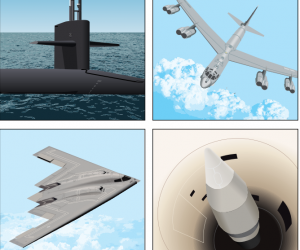
Sorry, your browser is not compatible with this application. Please use the latest version of Google Chrome, Mozilla Firefox, Microsoft Edge or Safari.
The Potential Costs of Expanding U.S. Strategic Nuclear Forces If the New START Treaty Expires
The New Strategic Arms Reduction Treaty (New START) between the United States and Russia will expire in February 2021 unless both parties agree to an extension, which could last for up to five years. That treaty places limits on the number of deployed strategic nuclear warheads (1,550) and delivery systems (800 missile launchers and bombers, 700 of which may be deployed at any given time) that each country may field.
How and when the United States or Russia would respond to the expiration of New START is unclear. To help policymakers understand the budgetary implications of one potential course of action the United States could take, the Congressional Budget Office was asked to examine the potential costs that the Department of Defense (DoD) might incur if the United States chose to increase its strategic nuclear forces to levels that are roughly consistent with the limits under three earlier arms control treaties.

| Format: |
|
| Topics: | |
| Website: | Visit Publisher Website |
| Publisher: | Congressional Research Service |
| Published: | August 1, 2020 |
| License: | Public Domain |
Featured Content

Contact Publisher


Claim Content





